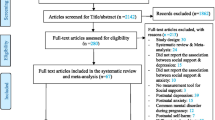Abstract
Objective
To evaluate the association between prenatal stress and gestational weight gain (GWG).
Study design
This was an analysis of women recruited between 2013–2015 from four sites in the US. We tested associations between responses at 32–35 weeks to the Life Experiences Survey (LES), a 37-item measure of events and perceived stress, and GWG categories. Bivariable comparisons and logistic regression were used to estimate the association between the total LES score and the odds of achieving adequate GWG.
Result
Among the 725 women, those with adequate GWG had lower median LES scores (5) compared to women with inadequate (7) and excessive (7) GWG, p = 0.02. After adjusting for age, initial BMI, income, education, marital status and gestational diabetes, lower LES scores (multiples of the median) were associated with adequate GWG (aOR 0.81, 95% CI 0.67–0.98).
Conclusion
Lower reported stress, as measured by the LES, was associated with a greater chance of women achieving adequate GWG. This relationship highlights the potential for interventions directed toward psychosocial support to have salutary effects upon GWG.
Similar content being viewed by others
References
Institute of Medicine. Weight gain during pregnancy: reexamining the guidelines National Academies Press 2009; Washington, DC.
Deputy NP, Sharma AJ, Kim SY, Hinkle SN. Prevalence and characteristics associated with gestational weight gain adequacy. Obstet Gynecol. 2015;125:773–81.
Klatzkin RR, Gaffney S, Cyrus K, Bigus E, Brownley KA. Stress-induced eating in women with binge-eating disorder and obesity. Biol Psychol. 2016;131:96–106.
Lindsay KL, Buss C, Wadhwa PD, Entringer S. The interplay between maternal nutrition and stress during pregnancy: issues and considerations. Ann Nutr Metab. 2017;70:191–200.
Brawarsky P, Stotland NE, Jackson RA, Fuentes-Afflick E, Escobar GJ, Rubashkin N, et al. Pre-pregnancy and pregnancy-related factors and the risk of excessive or inadequate gestational weight gain. Int J Gynaecol Obstet. 2005;91:125–31.
Hickey CA, Cliver SP, Goldenberg RL, McNeal SF, Hoffman HJ. Relationship of psychosocial status to low prenatal weight gain among nonobese black and white women delivering at term. Obstet Gynecol. 1995;86:177–83.
Orr ST, James SA, Miller CA, Barakat B, Daikoku N, Pupkin M, et al. Psychosocial stressors and low birthweight in an urban population. Am J Prev Med. 1996;12:459–66.
Picone TA, Allen LH, Schramm MM, Olsen PN. Pregnancy outcome in North American women. I. Effects of diet, cigarette smoking, and psychological stress on maternal weight gain. Am J Clin Nutr. 1982;36:1205–13.
Webb JB, Siega-Riz AM, Dole N. Psychosocial determinants of adequacy of gestational weight gain. Obes (Silver Spring). 2009;17:300–9.
Sarason IG, Johnson JH, Siegel JM. Assessing the impact of life changes: development of the life experiences survey. J Consult Clin Psychol. 1978;46:932–46.
Savitz DA, Stein CR, Siega-Riz AM, Herring AH. Gestational weight gain and birth outcome in relation to prepregnancy body mass index and ethnicity. Ann Epidemiol. 2011;21:78–85.
Chen MJ, Grobman WA, Gollan JK, Borders AE. The use of psychosocial stress scales in preterm birth research. Am J Obstet Gynecol. 2011;205:402–34.
Norbeck JS, Tilden VP. Life stress, social support, and emotional disequilibrium in complications of pregnancy: a prospective, multivariate study. J Health Soc Behav. 1983;24:30–46.
Kapadia MZ, Gaston A, Van Blyderveen S, Schmidt L, Beyene J, McDonald H, et al. Psychological antecedents of excess gestational weight gain: a systematic review. BMC Pregnancy Childbirth. 2015;15:107.
Hartley E, McPhie S, Skouteris H, Fuller-Tyszkiewicz M, Hill B. Psychosocial risk factors for excessive gestational weight gain: a systematic review. Women Birth. 2015;28:e99–e109.
Block JP, He Y, Zaslavsky AM, Ding L, Ayanian JZ. Psychosocial stress and change in weight among US adults. Am J Epidemiol. 2009;170:181–92.
Overgaard D, Gamborg M, Gyntelberg F, Heitmann BL. Psychological workload and weight gain among women with and without familial obesity. Obes (Silver Spring). 2006;14:458–63.
Serlachius A, Hamer M, Wardle J. Stress and weight change in university students in the United Kingdom. Physiol Behav. 2007;92:548–53.
Vicennati V, Pasqui F, Cavazza C, Pagotto U, Pasquali R. Stress-related development of obesity and cortisol in women. Obes (Silver Spring). 2009;17:1678–83.
Adam TC, Epel ES. Stress, eating and the reward system. Physiol Behav. 2007;91:449–58.
Lindsay JR, Nieman LK. The hypothalamic-pituitary-adrenal axis in pregnancy: challenges in disease detection and treatment. Endocr Rev. 2005;26:775–99.
Funding
This study was supported by: HHSN275201200007—HHSN27500005. National Children’s Study: Vanguard Study—Task Order 5: Stress and Cortisol Measurement for the National Children’s Study (AB) and K23HD076010 from the Eunice Kennedy Shriver National Institute of Child Health & Human Development of the National Institutes of Health (MAK).
Author information
Authors and Affiliations
Corresponding author
Ethics declarations
Conflict of interest
The authors declare that they have no conflict of interest.
Rights and permissions
About this article
Cite this article
Kominiarek, M.A., Grobman, W., Adam, E. et al. Stress during pregnancy and gestational weight gain. J Perinatol 38, 462–467 (2018). https://doi.org/10.1038/s41372-018-0051-9
Received:
Revised:
Accepted:
Published:
Issue Date:
DOI: https://doi.org/10.1038/s41372-018-0051-9
- Springer Nature America, Inc.
This article is cited by
-
Effects of maternal pre-pregnancy body mass index and gestational weight gain on antenatal mental disorders in China: a prospective study
BMC Pregnancy and Childbirth (2023)
-
Third trimester cortisol is positively associated with gestational weight gain in pregnant women with class one obesity
International Journal of Obesity (2022)
-
Psychosocial stress and longitudinally measured gestational weight gain throughout pregnancy: The Ulm SPATZ Health Study
Scientific Reports (2020)
-
Effective large for gestational age prediction using machine learning techniques with monitoring biochemical indicators
The Journal of Supercomputing (2020)
-
Diagnosis of large-for-gestational-age infants using a semi-supervised feature learned from expert and data
Multimedia Tools and Applications (2020)




